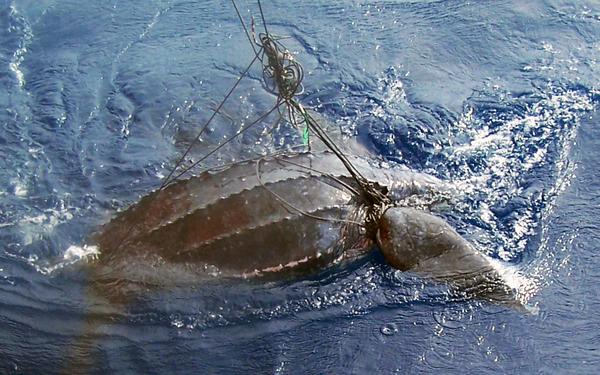
A Leatherback sea turtle is captured in a longline. | Photo by Philip Miller.
Turtle Island Restoration Network (TIRN) submitted a letter and comments on behalf of almost 3,000 environmental activists to the Pacific Fisheries Management Council this week to comment on its proposal to authorize a new longline fishery in the Pacific Ocean. The authorization would operate off California despite a federal ban on longline gear created in 2004 to protect sea turtles.
The letter, sent on Monday as part of the public comment period, asserts that leatherback sea turtles are facing extinction in the near future, and the authorization of shallow set longline gear will ensure extinction happens. In addition to stating on their website that NOAA Fisheries have made it “a priority to focus recovery efforts on stabilizing and recovering Pacific leatherback population in order to prevent extinction,” NOAA Fisheries recognizes the primary threat to leatherback sea turtles as incidental capture in fishing gear.
“If NOAA Fisheries is serious about recovering Pacific leatherback populations in order to prevent their extinction, the obvious course of action would be to restrict the greatest threats facing these sea turtles: incidental capture in [shallow set longline] gear,” the letter states.
The letter also reveals several additional reasons why the Pacific Fisheries Management Council and NOAA Fisheries should disallow all shallow set longline gear in the West Coast, ranging from contradicting current mandates to violating human rights abuses:
- Allowing shallow set longline gear in the West Coast contradicts the Council’s mandate of minimizing bycatch to the extent practicable.
- Allowing shallow set longline gear in the West Coast contradicts goals of the Swordfish Management and Monitoring Plan.
- Shallow set longline gear in the West Coast Exclusive Economic Zone will jeopardize the continued existence of Pacific leatherback sea turtles, as well as other federally protected species, and therefore violates the Endangered Species Act (ESA).
- Leatherback sea turtles are facing extinction in the near future, and the authorization of shallow set longline gear will ensure extinction happens.
- Hawaii-permitted shallow set longline vessels are linked very closely to slavery and human rights abuses; we should end Hawaii shallow set longline practices and prevent similar practices from making their way to the West Coast.
- Swordfish often contain toxic levels of mercury and should be discouraged as a protein source.
Click here to read the full letter.
The comments were submitted on behalf of 2,745 Individuals of the United States and U.S. Territories who agree that California is finally taking the right step and transitioning away from the drift gillnet fishery; we must not let one devastating fishing method be replaced by another equally destructive method.
“California’s ecosystem is home to international nursery areas for sharks, is an important feeding destination for critically endangered sea turtles, and is simply too important to ruin with harmful indiscriminate fishing gear,” the letter states.
Click here to read the submitted comments.
Turtle Island Restoration Network was among several environmental groups who submitted comments, urging the Pacific Fishery Management Council to oppose the authorization of this deadly fishery. Even Eric Sklar, president of the California Fish and Game Commission, submitted a comment against the use of shallow-set longline gear due to “unacceptable levels of bycatch and interactions with protected species.”
On November 19, Turtle Island Restoration Network will join activists from several environmental groups including The SeaChange Agency, Oceana, The Center for Biological Diversity, and more at the Pacific Fishery Management Council’s meeting in Costa Mesa, California to submit public testimony. We need as many people as possible to join us at the meeting, to show an abundance of support and solidarity for our position against reauthorizing the longline fishery.
If you are able—or know anyone who is able—to join us, please stand with us and invite your friends to Californians Against Longlines to be the voice for sea turtles, sharks and all other sea life that can’t speak for themselves.
You can join the fight against longlines by signing up for TIRN’s email list or making a gift today.




